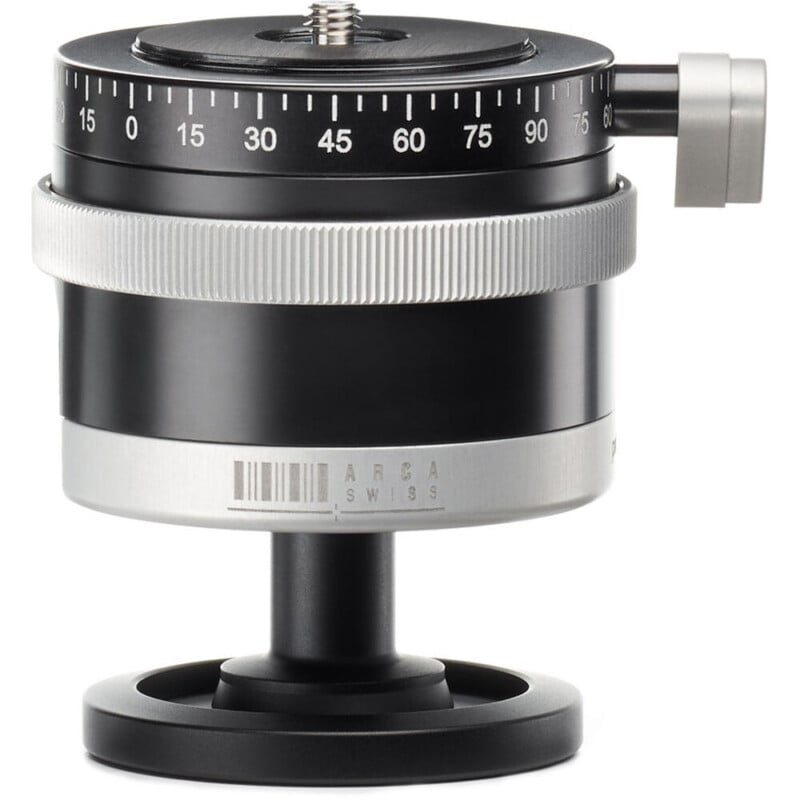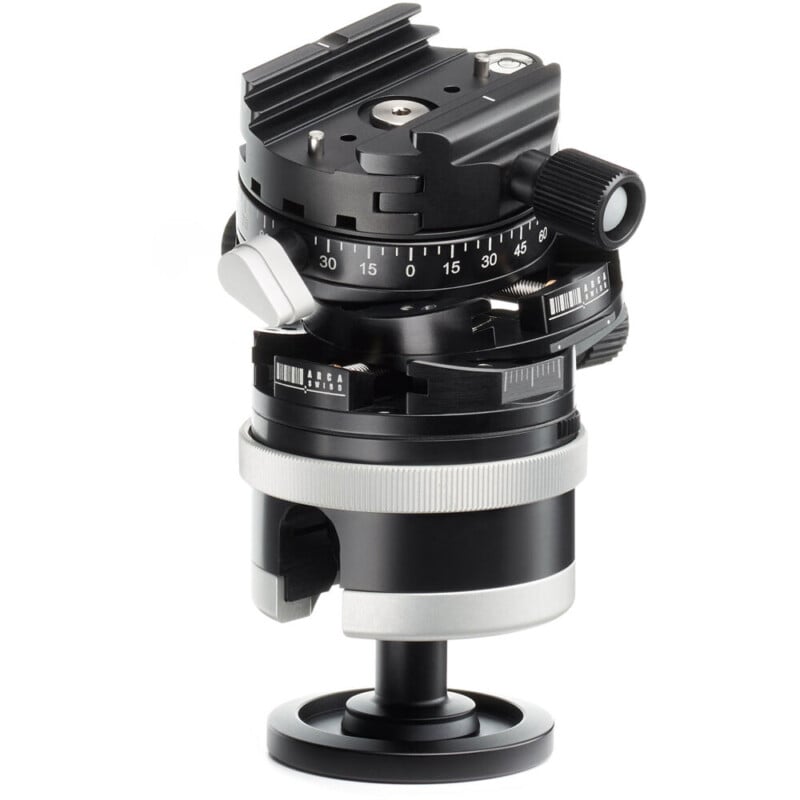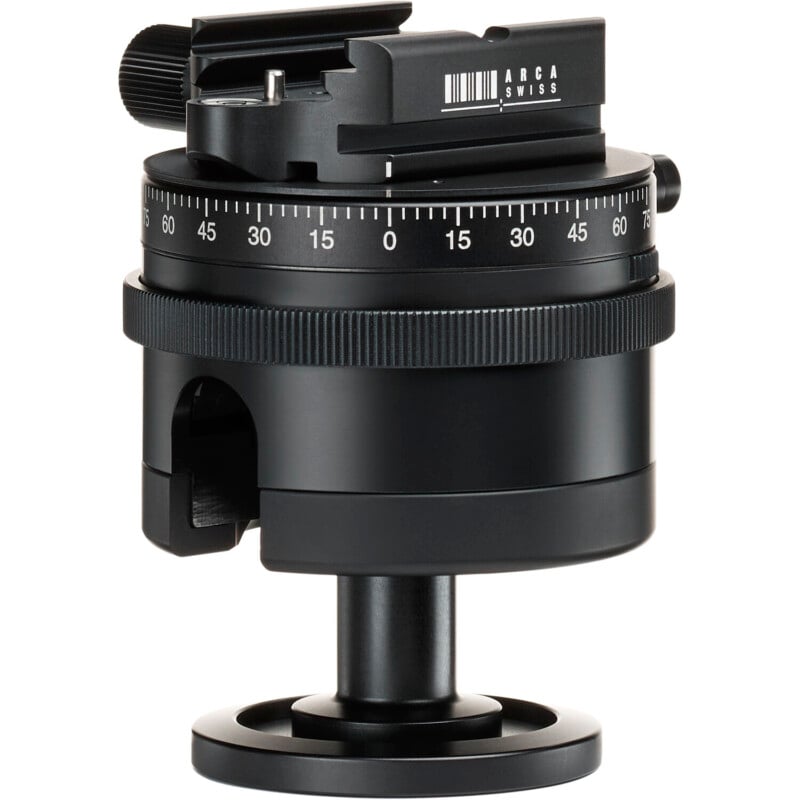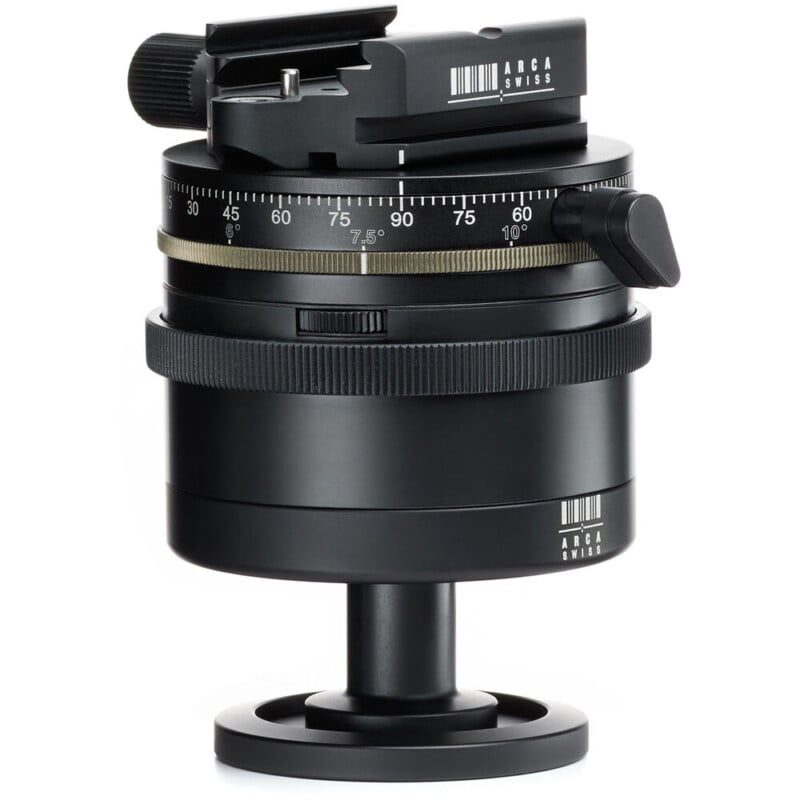A tripod head is one of the most important pieces of equipment a photographer can own. Most photographers start with cheap, shoddily built tripods with integrated heads, sometimes bought as part of a kit. While they don’t know it, these tripods aren’t worth their weight in plastic, which is a fancy way of saying they’re worthless.
Eventually, as photographers gain skill and experience, they invest in a solid set of legs and a tripod head. A good tripod might last decades — many manufacturers even offer up to 10-year warranties. The same is true of tripod heads. Spend now, save later, when it comes to these two accessories.
Thus, we wanted to put together a guide for the best tripod heads to complement it. Options here range from sub-$100 to the best of the best. As usual, we’ve broken this down into numerous categories, including heads for both photography and video/filmmaking.
You can find PetaPixel‘s guide for the best tripod heads here.
At a Glance
Best Ultimate Tripod Head: Arca-Swiss C1 Cube / C1 Cube cp
![]()
The Arca-Swiss C1 Cube is the epitome of precision engineering in tripod head design, highly regarded by professional photographers for its exceptional accuracy and stability. Weighing either 2.2, 2.4, or 2.6 pounds, depending on which version you get, this robust head is designed to provide unparalleled stability and fine-tuned control, making it ideal for critical applications such as macro, product, and architectural photography, as well as detailed landscape compositions. It’s also great for those who use big and heavy 4×5 or 8×10 large-format cameras. Did I mention they have a rated load capacity of 88 lbs (40 kg)? And when it comes to Arca Swiss, that’s no exaggeration.
Handling the C1 Cube is a unique experience due to its intricate design that allows for precise, independent movements along the x and y axes. This means photographers can adjust the position of their camera with extreme accuracy without affecting the alignment on the other axis. Such precision is indispensable for achieving sharp, perfectly aligned images. The large knobs are strategically placed and designed to facilitate easy adjustments. This ergonomic consideration ensures that photographers can modify settings quickly and comfortably, even in challenging conditions or when wearing gloves.
A notable feature of the Arca-Swiss C1 Cube is its dual panning capability. It includes a panning base at the bottom of the head and an additional panning mechanism directly below the camera platform. This setup is particularly beneficial for creating flawless panoramic images, allowing photographers to pan the camera without altering its vertical position.
![]()
Building on the foundation of the C1 Cube, the Arca-Swiss C1 Cube gp (geared panning) incorporates geared movements that enhance the head’s precision even further. The inclusion of geared panning facilitates even more points of precise control, which is especially valuable in situations where compositional perfection is critical.
Both the C1 Cube and the C1 Cube gp are firmly in the realm of photographers who require the absolute highest level of design and precision. They are the Sistine Chapel of photographic tripod heads — absolutely nothing else compares and they are masterpieces of design and utility.
Best “Pan and Tilt” Tripod Head: Arca-Swiss d4
![]()
The Arca Swiss d4 tripod head exemplifies cutting-edge technology in the realm of photography gear. This robust tripod head is engineered for both studio and field applications, offering photographers unparalleled control and stability for their cameras.
Weighing approximately 1.8 lbs (about 800 grams), the Arca Swiss d4 is remarkably lightweight for its class, considering the heavy-duty tasks it handles. Its compact design does not compromise on strength, making it a preferred choice for professionals who require reliable support without the burden of excess weight.
One of the standout features of the d4 is its dual panning capability. This allows photographers to pan the camera from the base or the top of the head, providing exceptional flexibility in framing shots. The top panning mechanism is particularly useful for making fine adjustments to the composition without disturbing the already set base level.
![]()
Ergonomically, the d4 shines with intuitively placed knobs that allow for quick and precise adjustments. The controls are designed to ensure that users can easily manipulate the head even in challenging environments or when wearing gloves. Each knob is distinct in function, reducing the learning curve and enhancing the overall handling experience. Additionally, the d4 incorporates the good ole Arca Swiss quick-release system, which you can get in “Classic Knob,” “FlipLock Lever” and “MonoballFix” flavors like the Arca Swiss p0/p1.
The Arca Swiss d4 tripod head is my go-to head for precise and controlled macro work and product photography. It’s basically a smaller, lighter, and simpler Arca Swiss Cube.
Best Ball Tripod Head: Arca-Swiss Monoball p0 / Monoball P0+ / Monoball P1+

The Arca Swiss Monoball series, including the p0, p0+ Hybrid, p1+, and p1 + cp, stands out in the world of photography equipment for its innovative design and functionality, tailored to meet the varying needs of photographers in terms of flexibility, precision, and usability.
The Arca Swiss Monoball p0 is notable for its unique “upside down” ball design, where the ball is inverted, allowing the locking mechanism to sit at the top of the ball head, rather than at the bottom. Essentially, the p0 has a grooved collar around the middle of the head that locks it down, allowing you to precisely position the frame with both hands and lock the head into place without moving one hand to a separate knob. It is easily one of the best purchases I have ever made. This design provides increased stability and a lower center of gravity, minimizing the risk of unwanted shifts during shooting. The p0 is great due to its compactness and ease of use (it really couldn’t be simpler to use) and it makes an excellent travel head.
For what it’s worth, I own the Arca Swiss p0, and it is my most used tripod head — and I have six that all serve different purposes. It’s one of only two ball heads I have ever used (the other being the Manfrotto 468 Hydrostatic) that exhibited zero droop after locking down with a moderate or heavy load (I probably ordered and returned over a dozen heads before finally finding The One).

Advancing the design of the p0, the Arca Swiss Monoball p0+ Hybrid incorporates additional features that enhance its versatility. One of the major enhancements is the introduction of a geared fine-tuning mechanism, allowing for more precise adjustments after the ball has been positioned by hand. This model is particularly advantageous for photographers who engage in genres requiring meticulous composition adjustments, such as macro or product photography.

Moving to the Arca Swiss Monoball p1+, this model shifts away from the inverted design and utilizes a more traditional ball head mechanism but with superior engineering and materials. The p1+ focuses on providing a very smooth, controlled movement and more precise locking, courtesy of its innovative locking system that applies pressure evenly around the ball for a more secure hold. This model is suited to photographers who prefer the traditional feel and operation but demand higher precision and control.
The Arca Swiss Monoball p1+ cp (ClicPan) builds upon the p1+ by incorporating the Classic Panning system, which integrates a separate panning base under the ball head. This feature is invaluable for landscape and panoramic photographers who require smooth horizontal rotation without compromising the stability or position of the vertical tilt. The addition of the panning system makes it more robust and suitable for intensive use in the field, where precise control over both panning and tilting is essential.

Each model in the Arca Swiss Monoball series offers unique features catering to different photographic needs and preferences. While all models share the high-quality construction and precision for which Arca Swiss is known, the choice between them depends on specific requirements like ease of use, the need for fine adjustments, or the necessity for separate panning control.
I could not more strongly recommend these heads.
If you want something a bit cheaper, the Manfrotto XPRO Magnesium Ball Head is a great option at just under $200. It’s the successor model to the aforementioned Manfrotto 468 Hydrostatic that I once used.
Best Tripod Head Around $200: Benro GX35 Two Series Arca-Type Low Profile Aluminum Ball Head
![]()
Crafted from aluminum, the Benro GX35 Two Series Arca-Type Low Profile Aluminum Ball Head low-profile ball head combines strength and lightweight properties at a fairly affordable price point, making it a versatile head for most applications, especially traveling.
Despite its modest weight of just 400 grams (.88 lbs), the GX35 is capable of supporting a significant load, with a claimed maximum payload capacity of up to 77 lbs (35 kg). I’d personally take this with a grain of salt, but it is more than still more than capable of supporting the systems of 99% of photographers. Its low-profile design does lower the center of gravity of the mounted camera and lens, which enhances stability and reduces the likelihood of tipping.
One of the key features of this ball head is its precision movement. The Benro GX35 offers smooth and precise control, facilitated by its main ball locking knob which allows for quick and effortless adjustments. Additionally, it includes a separate tension control knob that lets photographers fine-tune the head’s friction based on the weight of their gear, providing more controlled movements.
Moreover, the GX35 features an independent pan lock that permits easy 360-degree panning, ideal for capturing panoramic images or making precise composition adjustments without affecting the tilt position. The head is also equipped with an Arca-type compatible quick-release plate system.
While the Benro GX35 offers many advantages, it is worth noting that its low-profile design, may not offer the ergonomic ease of use found in taller heads, particularly when precisely adjusting the controls or with gloves.
Best Tripod Head Under $100: Vanguard ALTA BH-100
![]()
The Vanguard ALTA BH-100 is a robust ball head designed for photographers who demand reliability and precision in their gear. Weighing approximately 1 pound, this tripod head is a solid choice for those who prioritize a balance of portability and functionality. Crafted from magnesium alloy, it’s both a durable yet lightweight option for budget users.
In terms of handling, the ALTA excels with its intuitive controls that facilitate quick and smooth adjustments. It features a large main locking knob that allows for easy manipulation, even when wearing gloves. This knob provides a firm grip and precise control over the ball’s movement, ensuring that photographers can achieve the desired angle with minimal effort. Additionally, it has a separate pan lock that secures the head’s rotation, which is ideal for capturing panoramic shots without disturbing the vertical alignment. The knobs and mechanisms are strategically positioned to be within easy reach, reducing strain during prolonged use. The ALTA also includes a degree scale on the base, which aids in repeatable pans and precise compositions. Finally, the ALTA features a friction control dial, allowing photographers to fine-tune the resistance of the ball movement according to the weight of their equipment.
As we love to see on most photographic tripod heads, the ALTA is fitted with an Arca-Swiss compatible quick-release system. Its rated impressive load capacity of up to 22 lbs (10kg), though given its price point, don’t expect it to breezily handle a hefty medium format camera setup. But lighter-weight DSLRs and especially mirrorless cameras should have no problems.
Best Gimbal Tripod Head: Wimberley WH-200 II
![]()
The Wimberley WH-200 II gimbal head stands as a pinnacle in the world of wildlife and sports photography, providing effortless support and fluid motion for large telephoto lenses. This gimbal head is designed to balance a camera and lens system on its natural center of gravity, allowing for smooth and responsive movement in all directions, which is essential for tracking fast-moving subjects.
Weighing in at approximately 1.4 kg (3.15 pounds), the WH-200 II is constructed from robust, anodized aluminum, ensuring durability and resistance to wear under rigorous field conditions. Despite its sturdy build, it maintains a manageable weight, making it a practical choice for photographers who often shoot in diverse and remote locations.
Handling and ergonomics are areas where the WH-200 II excels. The head features a large, soft-touch knob for locking the swing arm, allowing for quick adjustments and securing the head firmly in place. This ensures that the camera stays stable, even when using heavy lenses. Additionally, the vertical and horizontal tracking knobs are smooth and easy to operate, providing fine control without the need for excessive force or repositioning.
![]()
Like most tripod heads these days, the Wimberley WH-200 features an Arca-Swiss quick release. The head also includes a built-in safety stop groove that prevents the camera and lens from sliding out during adjustments.
The Wimberley WH-200 II gimbal head offers top-tier performance for professional photographers specializing in action and wildlife photography. Its robust build, combined with smooth handling and precise control mechanisms, make it an essential tool for capturing high-quality images in fast-paced, challenging conditions.
Best Panoramic Tripod Head: Acratech Panoramic Head
![]()
The Acratech Panoramic Head is a finely crafted piece of equipment designed to meet the needs of photographers who specialize in panoramic photography. Known for its precision and versatility, this head allows for seamless panoramic captures and multi-row gigapixel images.
Weighing in at a mere 1 pound (0.45 kg), the Acratech Panoramic Head is remarkably lightweight, making it an ideal companion for travel and fieldwork where carrying minimal gear is essential. Despite its lightness, it does not sacrifice stability or strength, thanks to its solid construction from precision CNC-machined anodized aluminum, which provides it with a rated load capacity of up to 25 lbs (11.3 kg).
The head features laser-engraved degree markings that facilitate accurate panoramic captures, which are especially useful for creating large-scale panoramas where precision is crucial. The quick-release system is compatible with Arca-Swiss plates, allowing for easy and quick setup and changes between shots or different equipment.
Ergonomically, the head is designed with comfort and ease of use in mind. It features large, easily adjustable knobs that make fine-tuning the position of the camera effortless, even in challenging outdoor conditions or when wearing gloves. The knobs are designed to ensure a tight grip without requiring excessive force, which enhances the user experience during extended shooting sessions.
One of the standout features of the Acratech Panoramic Head is its ability to rotate both horizontally and vertically, allowing photographers to achieve not only traditional panoramas but also explore creative vertical panoramic shots. The head’s design ensures that the rotation is smooth and consistent, providing excellent control over camera movements.
Best Timelapse Tripod Head: Syrp Genie II 3-Axis Kit
![]()
The Syrp Genie II 3-Axis Kit is an advanced motion control system designed to elevate the creative capabilities of filmmakers and photographers. This comprehensive kit combines the Genie II Linear with the Genie II Pan Tilt, offering users complete three-axis control to create intricately detailed time-lapses and fluid, dynamic video sequences. Ideal for capturing everything from sweeping landscapes to action-packed scenes, the kit is an essential tool for those seeking to enhance their visual narrative.
With a total weight of just over three pounds, the Genie II 3 Axis Kit maintains a balance between robust functionality and portability. This moderate weight makes it suitable for fieldwork, allowing creators to bring professional-grade motion control into diverse shooting environments without excessive burden. The entire setup supports a maximum payload of up to 11 lbs (5 kg), making it compatible with a wide range of camera setups from DSLRs to lighter cinema cameras.
![]()
Operation of the Syrp Genie II 3 Axis Kit is streamlined through the intuitive Syrp Genie app, which simplifies the process of programming and controlling the device. Users can adjust settings such as movement speed, tracking distance, and shooting intervals directly from their smartphones or tablets, facilitating real-time adjustments and on-the-fly creativity. This wireless control not only enhances usability but also ensures that adjustments to the camera’s path or position can be made remotely.
The kit’s capacity for simultaneous slide, pan, and tilt movements opens up new possibilities for filmmakers and photographers to explore complex motion shots. These features allow for the creation of cinematic effects that are typically achievable only with more elaborate setups. The Syrp Genie II 3 Axis Kit’s combination of precision control, ease of use, and comprehensive motion capabilities makes it a wonderful tool for both photographers and videographers.
Alternatively, at about $800 cheaper, there is Syrp Genie II Linear, which is one component of the Genie II 3-Axis Kit. If you’re looking for something even cheaper, the Syrp Genie One Motion Control Pan Head/Linear Drive is an affordable motorized camera platform at just $299.99.
Best Tripod Head for Video: Miller CX2 / CX6 / CX8 / CX10 / CX14
![]()
The Miller CX series of fluid heads offers a comprehensive range of models tailored to meet the diverse demands of professional videographers and filmmakers. Each model is designed to cater to different payload capacities and filming requirements.
The Miller CX2, the cheapest model designed for lighter camera setups, supports payloads up to 17.6 lbs (8 kg). It’s an ideal choice for semi-pro or pro videographers who use hybrid mirrorless cameras or lighter cinema cameras like Blackmagic Pocket, RED Komodo, Z Cam, Kinefinity, or smaller Sonys such as the FX3 and FX6. The CX2 features Miller’s advanced fluid drag system, providing consistent performance and smooth movements, making it a solid choice for those starting in video production or for applications requiring minimal gear.
The Miller CX6 steps up in terms of payload capacity, supporting up to 26.5 lbs (12 kg), making it suitable for more professional camera rigs that include larger lenses and accessories. Like the CX2, it also features Miller’s fluid drag system but offers improved balancing capabilities and greater durability for handling more substantial setups, making it a good middle ground for professionals who need a reliable head for a variety of shooting conditions.
![]()
Moving to the Miller CX8, this head supports payloads up to 30.9 lbs (14 kg) and introduces stronger construction and enhanced fluid drag systems suitable for heavier and more complex camera setups. The Miller CX10 further increases the payload capacity to 35.3 lbs (16 kg) and includes additional features such as selectable counterbalance systems that allow videographers to fine-tune the head’s performance to match the specific weight and center of gravity of their camera setup. This model is particularly well-suited for broadcast environments or film sets where versatile configuration, high payload capacity, and exceptional control are necessary.
Finally, the Miller CX14 is the most robust model in the series, supporting payloads up to 44.1 lbs (20 kg). It is built for the most demanding filming conditions and high-end cinema cameras laden with accessories. The CX14 provides the highest level of stability and control, featuring Miller’s most advanced fluid drag and counterbalance systems, ensuring smooth, precise movements even with the heaviest rigs.
Each model in the Miller CX series builds on the last, offering increased payload capacities and progressively more sophisticated features. These enhancements make each subsequent model more suited to professional environments and complex filming needs. The downside across the series is generally the increasing weight and size with the more capable models, which might not be suitable for all travel or field-based video shoots. Nonetheless, for studio settings or locations where transport isn’t an issue, the Miller CX series stands out for its reliability, precision, and adaptability to a wide range of filming scenarios.
Best Mid-Range Tripod Head for Video: Manfrotto Nitrotech 608
![]()
The Manfrotto Nitrotech 608 fluid video head is a high-performance tool designed for professional videographers who demand precision and versatility. Weighing approximately 6.6 lbs (2.3 kg) with a maximum payload capacity of 17.6 lbs (8 kg), it’s a sturdy choice that provides robust support for a variety of camera setups.
One of the standout features of the Nitrotech 608 is its innovative nitrogen piston mechanism, which provides continuous counterbalance. This system allows users to precisely adjust the head to match the weight of their camera setup, ensuring smooth and controlled movements across both tilt and pan axes. This feature is particularly beneficial for handling heavier gear, supporting loads from 0 to 17.6 pounds.
The Nitrotech 608 includes easy-to-operate, side-locked levers that secure the camera quickly and without fuss. The flat base with a 3/8”-16 mounting thread is versatile, fitting most flat-base tripods or bowl-head adapters. The soft-touch knobs and levers are conveniently placed and offer a comfortable grip, reducing fatigue during long shooting sessions. The inclusion of a brightly illuminated bubble level aids in quick leveling even in low-light conditions.
![]()
I have the prior model — the Nitrotech N8 — and it has and continues to serve me quite well. I’ve used it with everything from a lighter Blackmagic Pocket 4K rig to a larger Blackmagic Ursa Mini Pro 12K with a heavy cine zoom lens and accessories galore.
If you want something a little more affordable, the Benro S8PRO Video Head is a great option at $314.95, while the Leofoto BV-15 Fluid Head is a solid choice at just over $200.
Best Tripod Head for Video Under $100: 3Pod Q3 Fluid Video Head
![]()
The 3Pod Q3 Fluid Video Head is quite impressive for its $79.95 price tag. It is relatively lightweight at around 2 pounds (0.9 kg), striking a good balance between stability and portability. Its construction primarily utilizes sturdy aluminum, ensuring durability without excessive weight, making it a practical choice for both studio and field use.
Handling the Q3 is straightforward and efficient, thanks to its fluid drag system on both pan and tilt axes. This system provides silky smooth movements, crucial for capturing professional-quality video without jerks or abrupt stops. The head features separate pan and tilt locks, allowing users to isolate movements for precise control. The positioning of knobs and levers is intuitive, making adjustments quick and straightforward even for those new to using video heads. Additionally, the long, adjustable pan handle can be positioned on either side of the head.
Among its features, the Q3 includes a balance plate with a sliding range to accommodate different camera setups, helping to achieve perfect balance and stability. It also sports a bubble level for accurate leveling, a quick-release plate for fast camera attachment and detachment, and support for up to 15 lbs (6.8 kg) of load, suitable for a wide range of DSLR, mirrorless, and small cinema cameras.
While this is to be expected given its price, the 15-pound weight limit might be restrictive for more demanding setups or heavier rigs. Additionally, I doubt this is a true fluid head — a true fluid head uses concentric rings with thick grease in between, while most sub-$500 heads are “fluid-like,” using friction to control the drag. The 3Pod Q3 also lacks a counterbalance system like higher-end heads.
Image credits: Elements of header photo licensed via Depositphotos.
